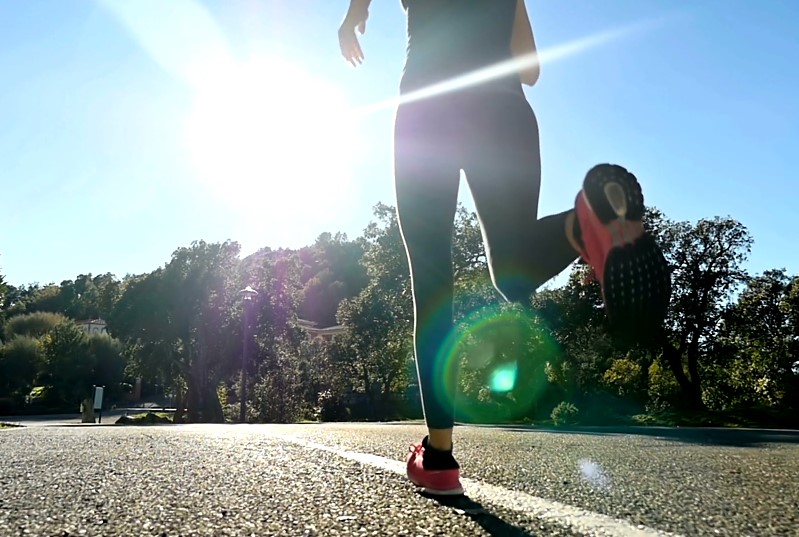Running is a fantastic way to stay fit and healthy, but it can also present its own set of challenges. One common issue that many of us runners have faced at least once is the sensation of heavy legs. This can be a frustrating experience, especially when it prevents you from reaching your full potential.
The feeling of dragging your feet, as if you’re running through quicksand, can be disheartening. But don’t worry, you’re not alone in this struggle. Before we delve into the solutions, it’s crucial to understand the problem.
Heavy legs during running can be a complex issue with several potential causes. It’s not just a matter of physical fatigue; there are a variety of factors at play. By understanding these, you can better address the issue and find ways to lighten your stride.
Which Factors Can Cause This?

Physical Factors
Your body is a complex machine, and several physiological factors can contribute to the sensation of heavy legs. These include muscle fatigue, lactic acid build-up, and dehydration. When you run, your muscles require more oxygen and energy. If they don’t get enough, they can tire quickly, leading to a feeling of heaviness.
This is why proper pacing and endurance training are crucial for long-distance running. Lactic acid is a byproduct of intense exercise. When it accumulates in your muscles, it can cause discomfort and a sensation of heaviness. This is particularly common during high-intensity workouts or when you push beyond your current fitness level.
Dehydration, on the other hand, reduces your blood volume, making it harder for your heart to pump oxygen and nutrients to your muscles. This can also lead to heavy legs. It’s not just about quenching your thirst; proper hydration is vital for maintaining your body’s overall function during a run.
Psychological Factors
Believe it or not, your mind plays a significant role in how your body feels during a run. Stress, anxiety, and lack of motivation can all contribute to the sensation of heavy legs. When you’re stressed or anxious, your body can tense up, making your muscles feel heavier than they actually are.
This is a physiological response to stress, where your body goes into a ‘fight or flight‘ mode, and your muscles prepare for action. A lack of motivation can also make your run feel more challenging. If you’re not excited about your run, you may perceive it as more difficult, which can manifest as heavy legs.
Remember, your mind and body are interconnected, and your mental state can significantly impact your physical performance. This is why mental training, including motivation and stress management, is just as important as physical training for runners.
How to Prevent This?

Now that we understand the problem, let’s look at how to prevent it. By taking a few proactive steps, you can reduce the likelihood of experiencing heavy legs during your runs. Prevention is always better than cure, and with the right strategies, you can keep your legs feeling light and ready to go the distance.
Proper Hydration
Staying hydrated is crucial for optimal performance. As we’ve mentioned, dehydration can lead to heavy legs by reducing your blood volume and making it harder for your heart to pump oxygen and nutrients to your muscles. But it’s not just about drinking a glass of water before you run.
Proper hydration involves consistently drinking enough water throughout the day. Aim to drink plenty of water throughout the day, not just before or after your run. If you’re going on a long run, consider bringing a water bottle with you or planning your route around water fountains.
If you’re thirsty, you’re already dehydrated. Also, keep in mind that hydration needs can vary based on factors like weather, your sweat rate, and the intensity and duration of your run.
Adequate Nutrition
Just like a car needs fuel to run, your body needs proper nutrition to function optimally. Consuming a balanced diet rich in carbohydrates, proteins, and healthy fats can provide your muscles with the energy they need to perform.
This is not just about your pre-run meal; your overall diet plays a significant role in your running performance and recovery. Before a run, opt for a light meal or snack that includes complex carbohydrates and a bit of protein. This will provide a steady source of energy for your muscles.
After your run, refuel with a mix of protein to aid in muscle recovery and carbohydrates to replenish energy stores. Keep in mind that nutrition needs can vary based on your body size, running intensity and duration, and overall activity level.
Train Your Body to Overcome This Problem!
Training techniques can also play a significant role in preventing and overcoming the sensation of heavy legs. By incorporating specific exercises and strategies into your routine, you can train your body to perform better. It’s not just about running more; it’s about running smarter.
Strength Training
Strength training can help improve your muscle endurance and efficiency, reducing the likelihood of experiencing heavy legs. Exercises like squats, lunges, and calf raises can strengthen the muscles used in running, making them more resistant to fatigue.
This can also improve your running form and efficiency, which can help prevent heavy legs. Incorporate strength training into your routine two to three times a week. Remember, it’s important to give your muscles time to rest and recover, so avoid strength training on consecutive days.
Also, keep in mind that strength training is not just about lifting heavy weights; bodyweight exercises can be just as effective for improving muscle strength and endurance.
Interval Training
Interval training involves alternating between periods of high-intensity exercise and recovery. This type of training can improve your cardiovascular fitness and muscle endurance, helping to prevent heavy legs.
It can also help improve your body’s ability to clear lactic acid, which can reduce the sensation of heavy legs during intense runs. Try incorporating interval runs into your routine once or twice a week.
Start with a warm-up, then alternate between running at a fast pace for a minute and jogging or walking for two minutes. As your fitness improves, you can increase the duration of the high-intensity intervals. Interval training should be challenging, but not to the point where you’re unable to recover between intervals.
Recovery Strategies

Even with the best prevention and training techniques, you may still experience heavy legs from time to time. When this happens, it’s important to have effective recovery strategies in place. Recovery is an essential part of training, and with the right strategies, you can bounce back stronger from heavy legs.
Active Recovery
Active recovery involves performing light, low-impact activities to help your muscles recover. This can include walking, cycling, or doing yoga. These activities promote blood flow to your muscles, helping to flush out lactic acid and deliver nutrients for recovery.
This can help reduce muscle stiffness and heaviness after a run. Try to incorporate active recovery into your routine, especially after intense or long runs. Remember, recovery is just as important as training in your running routine.
Keep in mind that active recovery should be easy and enjoyable; it’s not about pushing yourself, but about helping your body recover.
Rest and Sleep
Never underestimate the power of rest and sleep. Your body does most of its healing and rebuilding during sleep. By getting enough quality sleep, you give your body the time it needs to recover and prepare for your next run.
This can help prevent heavy legs and improve your overall running performance. Aim for seven to nine hours of sleep per night. If you’re training hard or increasing your mileage, you may need even more sleep to fully recover. Listen to your body and give it the rest it needs.
Also, consider incorporating relaxation techniques, like deep breathing or meditation, to help improve your sleep quality.
When to Seek Medical Help?

While heavy legs are often a result of the factors we’ve discussed, they can sometimes be a sign of a more serious issue. It’s important to know when to seek medical help. Listening to your body and recognizing when something is off is crucial for maintaining your health and running performance.
Chronic Compartment Syndrome
Chronic compartment syndrome is a condition that can cause a feeling of heaviness in the legs. It occurs when excessive pressure builds up within the muscles, reducing blood flow. This condition is often caused by repetitive activities like running.
It’s different from acute compartment syndrome, which is a medical emergency caused by a traumatic injury. If you experience persistent heavy legs, especially if the sensation is accompanied by pain, numbness, or swelling, it’s important to seek medical attention.
Chronic compartment syndrome often requires treatment to relieve the pressure and restore normal blood flow. This can include physical therapy, medication, or in some cases, surgery.
Venous Insufficiency
Venous insufficiency is a condition where the veins have trouble sending blood from the legs back to the heart. This can cause a feeling of heaviness, along with swelling and varicose veins. It’s a common condition, especially among older adults, but it can occur at any age.
If you notice these symptoms, it’s important to seek medical help. Treatment for venous insufficiency often involves lifestyle changes, medications, or in some cases, surgery. This can help improve blood flow and reduce the sensation of heavy legs.
FAQs:
Can the type of shoes I wear affect how my legs feel when running?
Yes, wearing the wrong shoes can contribute to heavy legs.
How can I choose the right running shoes to prevent this?
Choose shoes that offer a balance of stability and mobility. Lighter shoes that allow your feet and legs to move together can provide a better range of motion and reduce the feeling of heavy legs.
What is DOMS and how does it relate to heavy legs?
DOMS (Delayed Onset Muscle Soreness) is common after lower leg workouts and can impede your running performance, leading to the feeling of heavy legs.
How does overtraining lead to minor injuries?
Overtraining can lead to strains, sprains, or leg fractures, which can cause your legs to stiffen up while running as they are still healing.
What is the role of the hips in running?
The hips and core power the leg movement in running. Starting the push with your quads instead of your hips can lead to inefficient running form and heavy legs.
The bottom line
In conclusion, heavy legs during running can be a frustrating experience, but with the right understanding, prevention strategies, training techniques, and recovery methods, you can overcome this challenge.
Always listen to your body and seek medical help if needed. Running is a journey, and every step, even the heavy ones, brings you closer to your goal. So keep going, and happy running!
